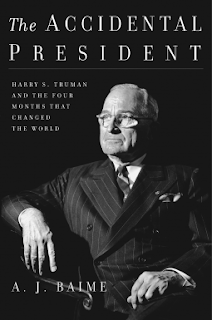America considered China a minor power. Europe after WWII garnered most of American attention. President Truman was assailed with conflicting views on how to deal with China. There was the domino theory and its fear of Communist take-over of Southeast Asia. For all the help that Chaing Ka-shek had received, the Nationalists were losing the war. Was their cause a 'rate hole' not worth throwing more money into? Britain was considering recognizing Mao as the new head of China. Should America follow suit?
Kevin Peraino's narrative history A Force So Swift was fascinating to read. The complicated history of the time comes to life, especially the machinations of Truman's White House and the people who sought to influence his policy. Names I heard growing up were brought to life. After reading The Accidental President by A. J. Baimie about Truman's first four months in the presidency it was interesting to see how he handled issues in his second term.
"......Truman and his N.S.C. filtered into the Cabinet Room at the White House....From an oil painting at the front of the room, the face of Woodrow Wilson stared down, judging them. For his entire adult life, Truman had sought to emulate Wilson, to continue the twenty-eighth president's quest to develop a "collective conscience" and a "common will of mankind" that might replace the chaos of conflicting interests that had defined the first half of the twentieth century."
Instead of consolidating a way to universal peace, Truman signed the policy paper to halt support to "non-Communist elements in China." America would no longer support Chaing Ka-shek, now isolated on Taiwan. Money would instead go to covert operations. America was to give "particular attention" to the French and Vietnamese conflict in Indochina. Meanwhile, Mao was celebrating his victory and had turned his attention to Korea. The choices made in 1949 led to the Korean conflict and the Vietnam War and have implications that reverberate to this day.
I received a free book from the publisher through Blogging for Books in exchange for a fair and unbiased review.
Drawing on Chinese and Russian sources, as well as recently declassified CIA documents, Kevin Peraino tells the story of this remarkable year through the eyes of the key players, including Mao Zedong, President Truman, Secretary of State Acheson, Minnesota congressman Walter Judd, and Madame Chiang Kai-shek, the influential first lady of the Republic of China. from the publisher

